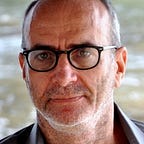Auschwitz and After: Can We Remain Sane and Still See the World’s Suffering?
The screenplay I wrote for my Creative Writing Master’s Degree Thesis, The Exiled Heart, is the story of a woman who survives Ravensbruck Concentration Camp, and after the war, slowly puts her life back together in 1947 Manhattan. In the course of doing research for the script and the accompanying essay we had to submit with it, I came across a stunning memoir, Auschwitz and After, written by Charlotte Delbo, one of a rare cohort of captured French resistantes sent to a concentration camp (most were interned domestically in French prisons.)
None of the scenes of my screenplay take place in the camp. I chose to focus on the far less cinematically-examined theme of what I coined “the disorientation of survival.” This syndrome was something I could identify with, namely, how hard it is to reclaim the psychic space in your brain where the future used to be; the future you’d learned to relinquish as a matter of brutally realistic expectations. (AIDS, even at it worst, was certainly not equivalent to the Holocaust. But those of us who survived it overwhelmingly did not expect to, and it took years for the quicksand beneath our feet to feel like terra firma again. That is how I used my own experience to imagine my heroine’s.)
On Holocaust Remembrance Day, we of course primarily take the opportunity to remember the Holocaust itself. But I would like to draw attention to how the memory of their trauma later operated in the lives of those who endured it. As the numbers of living survivors diminish by the day, it behooves us to preserve both parts of their pasts — what they remembered, and how they later remembered it. Because war, torture, poverty, domestic and child abuse — to name a few — still ravage the world, and the walking wounded of these traumas bear psychic scars they must grapple with just as urgently as Delbo grappled with hers. And those of us who have not so suffered must also grapple with how to respond to their suffering.
If you are a compassionate, empathetic person who refuses to put on blinders, you need only spend a few minutes reading the newspaper everyday to become easily overwhelmed. As I type this, someone is being tortured in Syria, a girl is undergoing genital mutilation in Ethiopia, a woman is being raped in Guatemala, a husband hits his wife in Khazakhstan, an foreman abuses an employee in Ecuador, a child works salvaging scraps from garbage in Cambodia, an untouchable in India cleans out a sewer. The are gulags in North Korea as dreadful as Dachau, prisons in Mississippi where rape is endemic, armies of adolescents terrorizing South Sudan. Twenty-five hundred years since the Buddha concluded human suffering is the central dilemma of human existence, we don’t seem to be making much progress. There is certainly no way for even the most willing brain to wrap itself around so much suffering. Is there even utility in trying?
C.S. Lewis wrote: There is no such thing as a sum of suffering, for no one suffers it. When we have reached the maximum that a single person can suffer, we have, no doubt, reached something very horrible, but we have reached all the suffering there can ever be in the universe. The addition of a million fellow sufferers adds no more pain.
He is addressing the reality that we are stuck in our own consciousness, and the extent to which we experience the suffering of others sympathetically is still limited by what we ourselves can suffer as a human being. Horribly, this is quite a lot of pain. (Ask any mother of a child with cancer.) But it is not limitless.
This is behind the Christian preoccupation with Christ’s suffering — three days upon a cross being competitive with the maximum suffering anyone can endure. To understand all suffering — including one’s own — one need only understand his — at least that’s the idea. I am not a Christian philosopher like C.S. Lewis, but I find it extremely helpful to take this approach to suffering and how to react to it. If “one death is a tragedy; and a million deaths is a statistic,” then equally, “save one person, and you save the world.”
On Holocaust Remembrance day, when I risk being submerged by despair, I take refuge in this idea that there is immense spiritual and practical value in grasping the suffering of one person as a time, and reacting to it with the same proportionality. Practicing kindness in your daily affairs may feel like a completely inadequate response to Auschwitz’s past and present, but it’s not nothing at all.
MCO 2017
